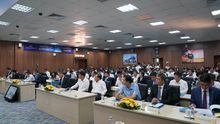 25 Jun 2024
25 Jun 2024
Tags: Vietnam Airlines, airlines, Vietnam

Today, Vietnam Airlines (HoSE: HVN) successfully held its 2024 Annual General Shareholders' Meeting, attended by representatives from the Commission for the Management of State Capital at Enterprises (CMSC) and existing shareholders of Vietnam Airlines.
At the meeting, Vietnam Airlines shareholders discussed and approved key agendas, including the 2024 business plan, the audited 2023 financial statements, the 2023 Board of Directors' activity report and the 2024 orientation plan. The national flag carrier recorded consolidated revenue of VND 93,265 billion in 2023, nearly 30 per cent higher than the previous year and approaching pre-pandemic peak levels. In 2024, Vietnam Airlines aims to balance revenue and expenditure with flexible solutions.
In 2023, the aviation industry continued to face challenges such as geopolitical conflicts, supply chain disruptions and a global economic downturn. Fuel prices remained high at over USD 105 per barrel; interest rates and exchange rates were unfavourable for Vietnam's aviation operations. Domestically, economic growth slowed, leading to weakened travel demand and a noticeable decrease in consumer purchasing power. International markets such as Australia, India and Southeast Asia showed positive signs while key markets in Northeast Asia recovered slower than expected.
Vietnam Airlines continued to overcome difficulties and achieved remarkable business results in 2023. The airline transported over 24.1 million passengers and 230,000 tons of cargo, up 16.4 per cent and 5.8 per cent year-on-year respectively. Positive operational results enabled Vietnam Airlines to achieve consolidated revenue of VND 93,265 billion, nearly 30 per cent higher than in 2022 and approaching the 2019 peak. Pre-tax consolidated losses decreased by VND 5,583 billion, halving compared to 2022.
Despite increased operational costs, Vietnam Airlines continuously improved its services, receiving positive customer feedback. The airline received prestigious international awards, including the " Global 5-Star Airline" by the Airline Passenger Experience Association (APEX); Top 20 Safest Airlines by AirlineRatings and World Travel Awards in four categories: "Asia's Leading Airline - Economy Class," "Asia's Leading Cultural Airline," "Asia's Leading Cabin Crew ," and "Asia's Leading Inflight Magazine."
To achieve these results, Vietnam Airlines implemented a comprehensive range of solutions closely aligned with market developments. The airline restored its international route network to 90 per cent of 2019 levels, adding new routes like Hanoi/ Ho Chi Minh City to Mumbai, Hanoi to Melbourne, and Ho Chi Minh City to Perth. The domestic route network continued to operate at pre-2019 levels. The airline effectively carried out commercial, advertising, and communication activities, increasing revenue and enhancing the brand image of Vietnam Airlines.
Additionally, Vietnam Airlines focused on cost management and thorough savings. Besides reducing costs according to production scale, the corporation implemented cost-saving measures, negotiated price reductions and deferred payments, cutting costs by an estimated VND 3,200 billion. Vietnam Airlines also proactively restructured loans and flexibly used short-term borrowing.
Notably, the airline enhanced its service enhancement strategy, incorporated new technologies into various processes and service touchpoints, resulting in improved productivity and customer satisfaction. In 2023, the Customer Satisfaction Index (CSI) exceeded targets with a domestic CSI of 4.17/5 and an international CSI of 4.0/5.
Dang Ngoc Hoa, Chairman of Vietnam Airlines, said: "In 2024, challenges continue to face the aviation sector such as macro-economic uncertainties. Based on business environment forecasts, Vietnam Airlines has set key objectives, directions, and tasks. The company will focus on restructuring assets, capital, investment portfolio, organisational structure and corporate governance reforms. The primary goal is to reduce losses and balance revenue and expenditure in 2024."
In 2024, the global economic and political landscape will remain challenging with prolonged geopolitical conflicts and high fuel prices at USD 104 per barrel. USD interest rates will remain high, affecting exchange rates and input costs. Global passenger volume is forecasted to fully recover to 2019 levels, but the Asia-Pacific region will need more time, especially Northeast Asia. Macro risks and airport infrastructure overloads remain. Pratt & Whitney's global engine recalls are causing aircraft shortages therefore impacting operations.
Vietnam's macroeconomic outlook shows positive signs, with the economy expected to grow steadily and the domestic aviation market growing by six to eight per cent. This sets a foundation for Vietnam Airlines to further reduce remaining losses and balance revenue and expenditure.
To achieve this goal, Vietnam Airlines will implement comprehensive solutions across all business aspects. The airline will boost its network expansion with new routes to Europe and Southeast Asia in 2024. In the domestic market, Vietnam Airlines will adjust flight frequencies to capitalise on demand, maintain a strong market share on key routes, and increase capacity on tourism routes. The airline will proactively develop operating plans based on various scenarios, enhancing product and price management capabilities.
For its fleet, Vietnam Airlines will focus on investing in narrow-body aircraft projects and converting the configuration of A321ceo aircraft to improve operational efficiency, meeting market demand and aligning with the fleet restructuring plan. The corporation will also complete preparations for investment in a comprehensive service complex at Long Thành International Airport to move into the investment implementation phase.
In terms of service, Vietnam Airlines continues to elevate its 5-star quality standards, aiming to inspire and promote new initiatives. The airline will tailor exceptional customer experience for different key routes, improve work processes, and apply digital transformation measures to enhance management efficiency and customer experience.
Vietnam Airlines will maintain stringent cost-saving and cost management programmes, seeking opportunities to negotiate reductions, deferrals and payment postponements. To maintain cash flow balance, the corporation will expedite capital divestment and implement measures to optimise costs, revenue, and financial management effectively.
The airline will continue its restructuring efforts to overcome the impacts of the COVID-19 pandemic and lay the foundation for sustainable development. The restructuring solutions focus on completing capital divestment from some subsidiaries, presenting to authorities the plan to extend the repayment period for re-lending loans, and promoting organisational restructuring, reducing intermediate levels, investing in technology and digital transformation to improve labour productivity and resource quality.
- ENDS -






